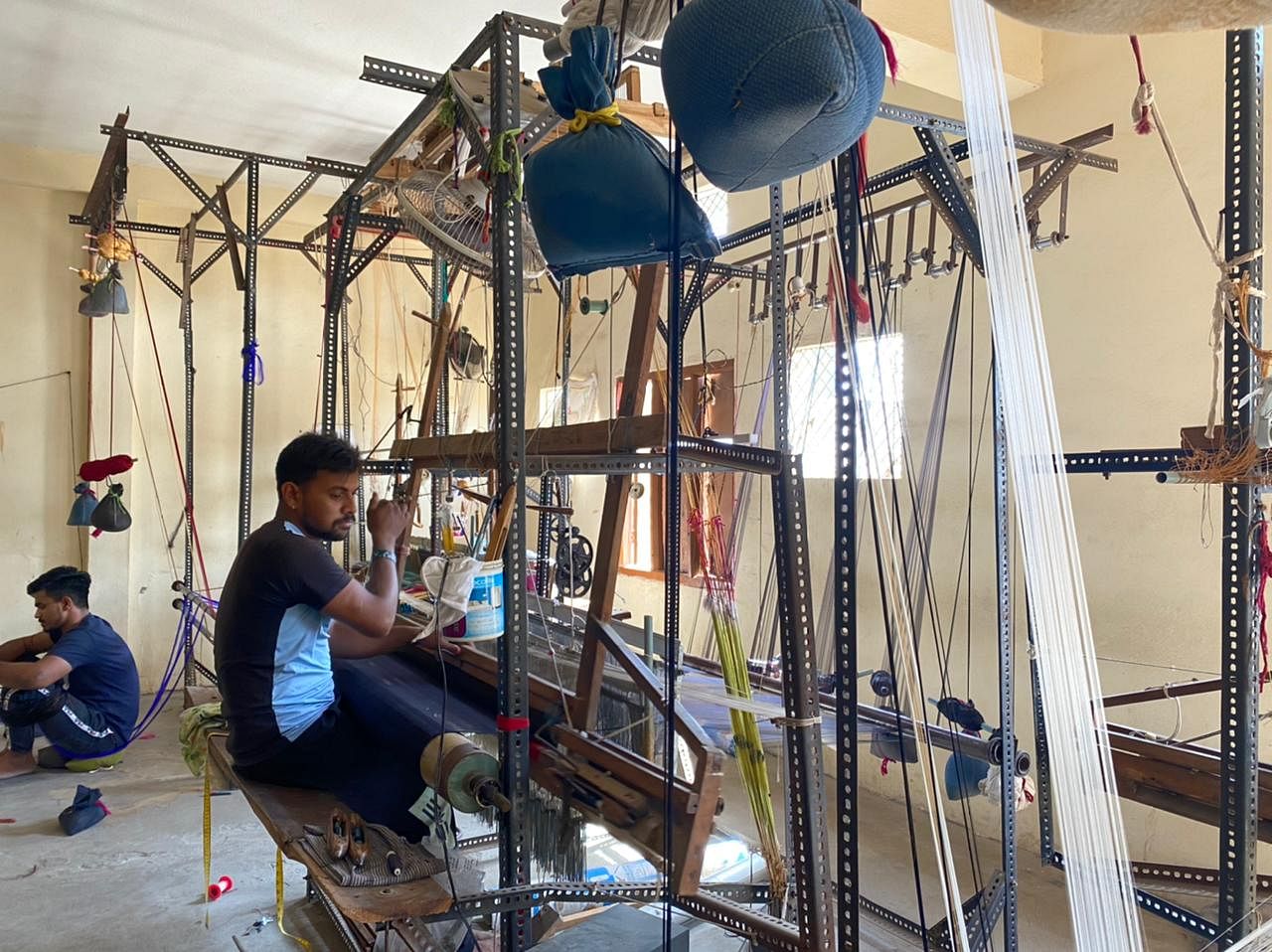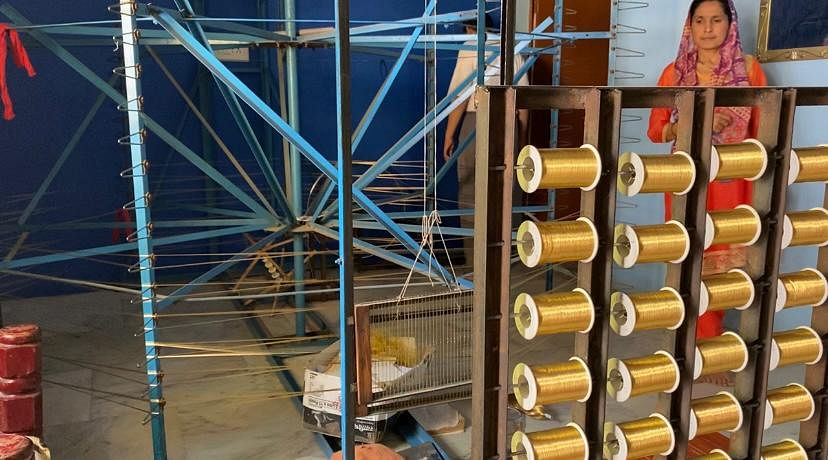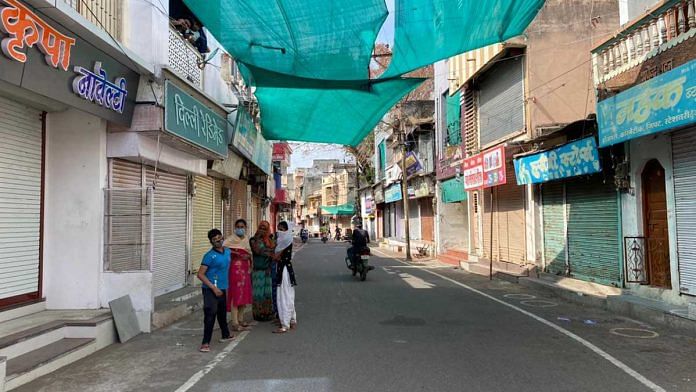Maheshwar: Just about 100 km from Indore, the temple town of Maheshwar in Madhya Pradesh — also known as the ‘weaving capital’ of the state — wears a desolate and deserted look.
The clickety-clack of the looms had just begun to fill the air in this sari-weaving town after nine months of a prolonged lockdown when the second wave of Covid infections hit India and orders dried up, flattening the fledgling economic curve once again.
It was only from October last year that the weavers went back to their livelihoods. By January, it looked like the industry was coming back on track. But with the resurgence of Covid cases in the past few weeks, the weavers were forced to shut shop indefinitely for the second time in two years.
As of Friday, the town had 275 active cases and had reported 12 deaths due to the virus, Milind Dhoke, the Sub-Divisional Magistrate of Maheshwar, told ThePrint. It also accounted for 22.7 per cent of the total active cases in the Khargone district, according to the state health bulletin.
For many families in Maheshwar, where the famous cotton or silk Maheswari sarees originate from, weaving is the only job they know and a handloom is visible in every second house.
“Business had just picked up again in October and was running at 60-70 per cent of what it used to be before corona but now it’s gone completely. Bilkul thap ho gaya (It’s completely shut down). If this continues and we get no help, then I fear that our handloom industry will cease to exist,” said Kishore Bille, owner of Rangara Krishna that dyes handlooms for Maheshwari sarees and exports them to Delhi, Mumbai and Bengaluru.
Bille’s concerns were reflected by the community at large. The weavers, karigars (craftsmen) and shop owners of this temple town said that while they feared the deadly Covid wave, they were equally afraid of being unable to provide for their families.
Some are even braving the virus to keep their looms running to keep orders in stock because according to them, this is the only work they know.
“I’m almost at the stage where I have nothing. Marne ki stithi ho gayi hai (I am close to dying),” 37-year-old Ramzan Ansari, owner of Ahmedabad Collection, told ThePrint.

Also read: The curious case of MP health minister who went missing for a month amid Covid spike
‘Handloom is in our DNA, don’t know what else to do’
Situated on the banks of the Narmada river, the town of Maheshwar has been a handloom weaving centre since the fifth century. Now, it supports not just shops and export houses but also weavers, suppliers of yarns, dyes, dyers and transporters.
However, with no work at present, many karigars have been forced to look for alternate work as daily wage labourers or vegetables sellers.
Anar Singh Kanel, 24, began working as a karigar when he was just 16 years old, but he is now worried about the lack of orders and sustaining his family of eight.
“I am scared of Covid, I don’t want to get it. But there is no money, so I need to work to get whatever little money I can. I am the only earning member in my family. I have to support eight people.”
Nishad Ansari, a 45-year-old karigar, said his family has been working around handlooms for generations and he himself knows no other work.
“Here, everyone works around handlooms, it is all we know. Handloom is in our DNA, it passes on with each generation. It has been going on for five generations in my family,” Nishad told ThePrint. And the desolation of these craftsmen were shared by their employers as well.
However, Aziz Ansari, 52, owner of Handweave India, has provided a silver lining to some of them.
Before the nationwide lockdown last year, Ansari had 50-60 karigars working under him but he has now scaled the number up to 100. According to him, this is the time when work is needed the most.
“The same way those who are unwell need medicines, people need jobs right now. Since the lockdown, I have retained everyone because this is the time, kaarigars need our support,” Ansari told ThePrint.
He also explained that demand has been almost nil and the cost of raw materials have also increased by 30 per cent. But he has still been managing to provide salaries to all his karigars by either cutting corners on his own expenditure or giving them less money.
Nor many people in Maheshwar, however, seemed to fear the virus. Very few could be seen sporting a mask, and those who did wore them incorrectly.

Also read: Not vaccine hesitancy, here’s what is keeping MP residents away from vaccination centres
‘No aid from state government’
According to a 2006 report in the Economic and Political Weekly, the handloom cluster in Maheshwar had an annual turnover of roughly Rs 6 crore.
However, this industry now faces a grim future.
To this end, the owners of export houses in the town, along with the Handloom Association (an association of the town’s weavers), wrote a letter to the state government in June 2020 requesting assistance. However, they are yet to receive a response and in the interim have lost all hope of aid from the government.
According to Raj Kumar Sarraf, assistant director at the district handloom office in Maheshwar, the letter to the state government focused on providing relief to the weavers.
“In the second wave, government is doing everything from their front but everything is shut. Karigars are now focusing on quality rather than quantity. We hope the online orders pick up like earlier,” said Sarraf.
Worried about their future, Bille and Chouhan said if no help comes they would be forced to shut down their handlooms, effectively discontinuing the famous Maheshwari sarees.
Ansari, meanwhile, is a bit more optimistic. “Weaving will continue no matter what. Till people are there, it will continue. It won’t go away just like that.”
(Edited by Rachel John)
Also read: No Covid tests for Kumbh returnees, no beds or data — how 2nd wave has hit Indore, Bhopal




Do not loose heart, we are facing an unpredictable virus at the moment. Efforts are on to arrest the second wave. Woh Subha Fir Se Ayegie…